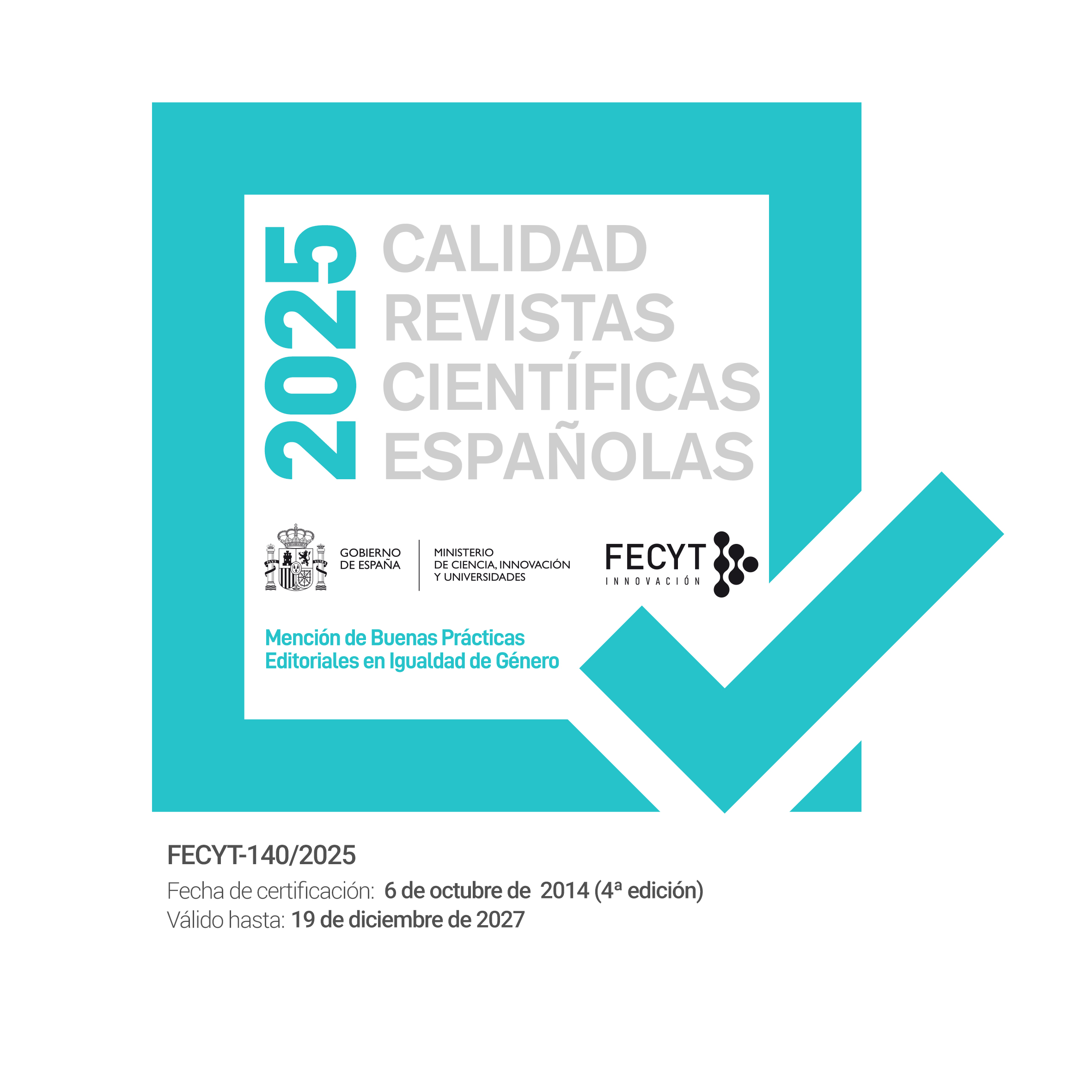Mentoría e integración social en la universidad: El aprendizaje por servicio en un proyecto del grado de periodismo
DOI:
https://doi.org/10.5944/educxx1.22694Palabras clave:
Aprendizaje por servicio, mentoría, educación superior, integración social.Resumen
Este artículo resume las percepciones de dos grupos de jóvenes (estudiantes de Periodismo y jóvenes adolescentes en tratamiento por diferentes adicciones y trastornos) sobre su participación en un proyecto de aprendizaje por servicio financiado por la UE (Erasmus+ Key Action 3), durante el curso 2017/2018. Las actividades de los estudiantes, integradas en el currículum de diferentes asignaturas, estaban orientadas a potenciar en los jóvenes mentorados competencias relacionadas con la producción periodística digital, la interpretación crítica y la educación en comunicación e interculturalidad. Las respuestas al cuestionario y los relatos de los focus group revelan el carácter recíproco de un aprendizaje potenciado por la proximidad generacional de ambos colectivos, que no se ha basado únicamente en la transmisión de contenidos, sino que también tiene carácter afectivo. Los estudiantes consideran que la interacción les ha inducido a estructurar y conceptualizar sus conocimientos, pero también a superar ideas preconcebidas y a desarrollar su empatía. Los jóvenes aprecian el contacto con un entorno que percibían como algo lejano e inaccesible y su participación directa en las prácticas colaborativas realizadas. El incremento de la autoestima y la mayor implicación de las mujeres son dos de los efectos más evidentes de las entrevistas grupales realizadas en ambos colectivos. El carácter gratificante de la experiencia podría estimular a los estudiantes más involucrados a realizar actividades de voluntariado en servicios civiles.
Descargas
Citas
Astin, AW., Vogelgesang, L.J., Ikeda, E.K., & Yee, J.A. (2000). How Service Learning Affects Students. Higher Education. Paper 144. Recuperado de https://bit.ly/2DXjUXv
Banaji, S., & Buckingham, D. (2010). Young people, the Internet and civil participation: an overview of key findings from the Civil Web Project. International Journal of Learning and Media, 2(1), 15-24.
https://doi.org/10.1162/ijlm_a_00038
Bennet, W.L. (2008). Changing Citizenship in the Digital Age. In W. L. Bennett (Ed.) Civic Life Online: Learning How Digital Media Can Engage Youth. The John D. and Catherine T. MacArthur Foundation Series on Digital Media and Learning (pp. 1-24). Cambridge, MA, USA: The MIT Press.
Blakeslee, J.E., & Keller, T.E. (2012). Building the youth mentoring knowledge base: Publishing trends and coauthorship networks. Journal of Community Psychology, 40(7), 845-859.
https://doi.org/10.1002/jcop.21494
Bueno, D. (2015, April 15). La mirada d’aprovació del mestre és més gratificant que un 10. El diari de l’educacio. https://bit.ly/2MSVYri
Castells, M. (2008). The New Public Sphere: Global Civil Society, Communication Networks and Global Governance. The Annals of the American Academy of Political and Social Science, 616 (1), 78-93.
https://doi.org/10.1177/0002716207311877
Collin, P. (2015). Young Citizens and Political Participation in a Digital Society: Addressing the Democratic Disconnect. London, UK: Palgrave Macmillan.
Crul, M. & Schneider, J. (2014). Mentoring: What can support projects achieve that schools cannot? Report of the Sirius education migration network. Brussels, Belgium: European Commission.
Recuperado de https://bit.ly/2KcMvrV
Currie-Mueller, J.L., & Littlefield, R.S. (2018). Embracing Service-learning Opportunities: Student Perceptions of Service-learning as an Aid to Effectively Learn Course Material. Journal of the Scholarship of Teaching and Learning, 18(1), 25-42. https://doi.org/10.14434/josotl.v18i1.21356
Del Basto, L.M. (2007). Lo público y la sociedad civil en el contexto de la Universidad. Revista Historia de la Educación Latinoamericana, 9, 231-254. Recuperado de https://bit.ly/2KbKD2G
Duncan, D., & Kopperud, J. (2008). Service-learning companion. Boston: Houghton Mifflin.
Escofet Roig, A., García González, I., y Gros Salvat, B. (2011). Las nuevas culturas de aprendizaje y su incidencia en la educación superior. Revista Mexicana de Investigación Educativa, 16(51), 1177-1195.
European Council (2018). Non-formal learning / education. Brussels, Belgium: European Council. Recuperado de https://bit.ly/2LHazIS
European Council (2009, November 27). Council Resolution: On a on a renewed framework for European cooperation in the youth field (2010-2018). Brussels, Belgium: European Council.
Recuperado de https://bit.ly/2GvC3gN
European Council (2005, May 1erst). Presidency conclusions 2005, March 22-23. Annex 1. Recuperado de https://bit.ly/2Ot9thX
Ferrés, J. (2014). Las pantallas y el cerebro emocional. Barcelona: Gedisa.
Ferrés, J., y Massanet, M.J. (2017). La eficacia comunicativa en la educacion: potenciando las emociones y el relato. Comunicar, 52, 51-60. http://dx.doi.org/10.3916/C52-2017-05
Feu, J., Prieto-Flores, O., y Mondéjar, E. (2016). Resultats del’estudi d’avaluació del’impacte dels programes de mentoria social. Girona: Universitat de Girona.
Hebert, A., & Hauf, P. (2015). Student learning through service-learning: Effects on academic development, civic responsibility, interpersonal skills and practical skills. Active Learning in Higher Education, 16(1), 37-49. https://doi.org/10.1177/1469787415573357
Jenkins, H. (2009). Confronting the Challenges of Participatory Culture. Media Education in the 21st Century. Chicago, USA: The McArthur Foundation.
Lee, J., Bell, L.F., & Levitt-Shaulskiy, S. (2017). Exploring mentors’ perceptions of mentees and the mentoring relationship in a multicultural service-learning context. Active Learning in Higher Education, 18(3), 243-256. https://doi.org/10.1177/1469787417715203
Martínez, M. (2008). Aprendizaje servicio y construcción de ciudadanía activa en la universidad: la dimensión social y cívica de los aprendizajes académicos. En M. Martínez (Ed.) Aprendizaje servicio y responsabilidad social de las universidades (pp. 11-26). Barcelona: Octaedro.
Menezes, H., Minillo, X., & Barros, I. (2016). University-Civil Society Collaboration for Implementing SDGs in Brazilian Northeast. Proceedings from the 2016 International Conference on Sustainable Development (ICSD) September 21st and 22nd at Columbia University, New York, USA.
Recuperado de https://bit.ly/2ArmfKJ
Noelle-Neumann, E. (1974). The spiral of silence. A theory of public opinion. Journal of Communication, 24(2), 43-51.
https://doi.org/10.1111/j.1460-2466.1974.tb00367.x
Petrovic, M. (2015). Mentoring in Europe and North America: Strategies for improving immigrants’ employment outcomes. Brussels, Belgium: Migration Policy Institute Europe. Recuperado de https://bit.ly/2KeuOIu
Politikon (2017). El muro invisible. Las dificultades de ser joven en España. Barcelona: Debate.
Prentice, M., & Robinson, G. (2010). Improving Student Learning Outcomes with Service Learning. Higher Education. Paper, 148.
Recuperado de https://bit.ly/2vu0UL9
Prieto-Flores, O., y Feu Gelis, J. (2018). ¿Que impacto pueden tener los programas de mentoría social en la sociedad? Una exploración de las evaluaciones existentes y propuesta de marco analítico. Pedagogía Social. Revista Interuniversitaria, 31, 153-167.
https://doi.org/10.7179/PSRI_2018.31.12
Rhodes, J. E., Spencer, R., Keller, T.E., Liang, B., & Noam, G. (2006). A model for the influence of mentoring relationships on youth development. Journal of Community Psychology, 34, 691-707.
https://doi.org/10.1002/jcop.20124
Serrano-Puche, J. (2016). Internet and Emotions: New Trends in an Emerging Field of Research. Comunicar, 46, 19-26.
https://doi.org/10.3916/C46-2016-02
Speck, B. (2001). Why service-learning? New Directions for Higher Education, 124, 3-13. doi: http://10.1002/he.8
Tappscott, D. (2008). Grown Up Digital: How the Net Generation is Changing Your World. Nueva York, USA: Mc Graw-Hill.
Tudor, S.L. (2013). Formal, nonformal, informal education, Procedia. Social and Behavioral Sciences, 76, 821-826.
https://doi.org/10.1016/j.sbspro.2013.04.213
Wells, C. V., & Grabert, C. (2014). Service-learning and mentoring: effective and pedagogical strategies. College Student Journal, 38(4), 573-578.
Wisla, H., Krauza, W., & Hu, J. (2017). Service-Learning: Boldly Going Where EAL Students Haven’t Gone Before. BC TEAL Journal, 2 (1), 1-13. Recuperado de https://bit.ly/2n0edis
Wörsching, M. (2008). ¿Desafección y uniformidad? Participación política juvenil en el Reino Unido. Revista de Estudios de la Juventud, 81, 95-111. Recuperado de https://bit.ly/2KckPDB
Publicado
Cómo citar
Número
Sección
Licencia
Derechos de autor 2019 Educación XX1

Esta obra está bajo una licencia internacional Creative Commons Atribución-NoComercial 4.0.
La revista Educación XX1 se publica bajo licencia Creative Commons Reconocimiento-NoComerciaL 4.0 (CC BY-NC 4.0). Se permite la generación de obras derivadas siempre que no se haga un uso comercial. Tampoco se puede utilizar la obra original con finalidades comerciales.










